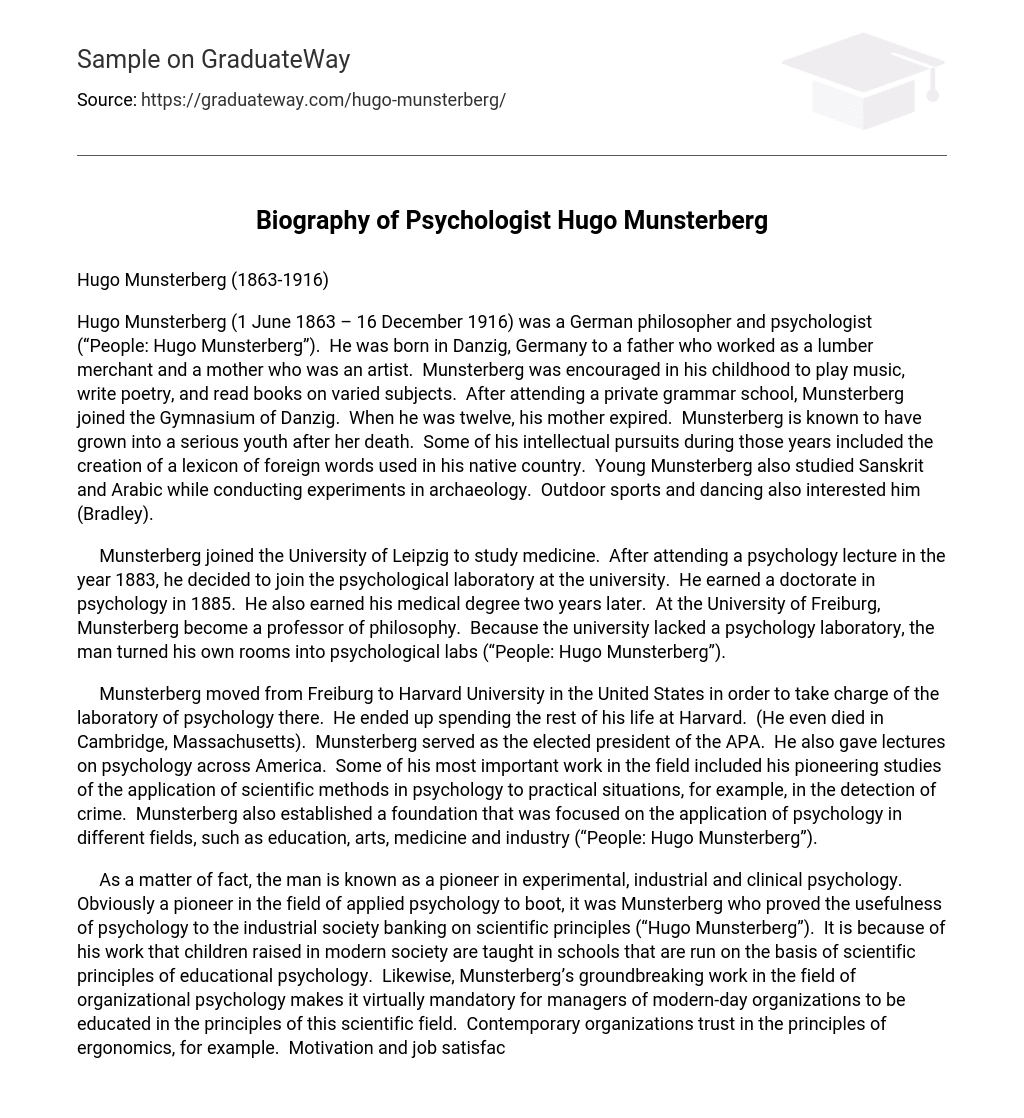Hugo Munsterberg (1863-1916)
Hugo Munsterberg (1 June 1863 – 16 December 1916) was a German philosopher and psychologist (“People: Hugo Munsterberg”). He was born in Danzig, Germany to a father who worked as a lumber merchant and a mother who was an artist. Munsterberg was encouraged in his childhood to play music, write poetry, and read books on varied subjects. After attending a private grammar school, Munsterberg joined the Gymnasium of Danzig. When he was twelve, his mother expired. Munsterberg is known to have grown into a serious youth after her death. Some of his intellectual pursuits during those years included the creation of a lexicon of foreign words used in his native country. Young Munsterberg also studied Sanskrit and Arabic while conducting experiments in archaeology. Outdoor sports and dancing also interested him (Bradley).
Munsterberg joined the University of Leipzig to study medicine. After attending a psychology lecture in the year 1883, he decided to join the psychological laboratory at the university. He earned a doctorate in psychology in 1885. He also earned his medical degree two years later. At the University of Freiburg, Munsterberg become a professor of philosophy. Because the university lacked a psychology laboratory, the man turned his own rooms into psychological labs (“People: Hugo Munsterberg”).
Munsterberg moved from Freiburg to Harvard University in the United States in order to take charge of the laboratory of psychology there. He ended up spending the rest of his life at Harvard. (He even died in Cambridge, Massachusetts). Munsterberg served as the elected president of the APA. He also gave lectures on psychology across America. Some of his most important work in the field included his pioneering studies of the application of scientific methods in psychology to practical situations, for example, in the detection of crime. Munsterberg also established a foundation that was focused on the application of psychology in different fields, such as education, arts, medicine and industry (“People: Hugo Munsterberg”).
As a matter of fact, the man is known as a pioneer in experimental, industrial and clinical psychology. Obviously a pioneer in the field of applied psychology to boot, it was Munsterberg who proved the usefulness of psychology to the industrial society banking on scientific principles (“Hugo Munsterberg”). It is because of his work that children raised in modern society are taught in schools that are run on the basis of scientific principles of educational psychology. Likewise, Munsterberg’s groundbreaking work in the field of organizational psychology makes it virtually mandatory for managers of modern-day organizations to be educated in the principles of this scientific field. Contemporary organizations trust in the principles of ergonomics, for example. Motivation and job satisfaction are considered facts of reality in the modern-day workplace – thanks to Munsterberg, who popularized the field of industrial psychology at a time when organizational managers were more interested in the efficient use of machinery than labor. He wrote about employee motivation and stress in the workplace. His book, Psychology and Industrial Efficiency, was a bestseller in the field of organizational behavior (Bradley).
Apart from his work to help people improve their performance in organizations, Munsterberg acted as a champion of behaviorism. He was also interested in applying psychological principles to legal situations, for example, in the examination of eye witnesses (Bradley). As in the contemporary workplace, his work brought permanent changes to the legal system of America. Indeed, judgments of psychologists are considered crucial in courts of law today. Munsterberg conducted many studies on people involved with courts of law. One of his controversial contributions to psychology included administration of one hundred mental tests to a murderer who had been paid by somebody to commit murder. Even though the psychologist proved that the murderer was telling the truth, the court of law refused to try the individual responsible for making payment for the murder. Still, Munsterberg continues to be known for his contributions to the field of forensic psychology (Bradley).
As a practicing clinical psychologist, Munsterberg did not charge his patients any fee. The methods he used in treating his mentally ill patients included word association, suggestion and autosuggestion – all of which continue to be used by modern-day clinical psychologists in varying degrees. His book, Psychotherapy, disagreed with Freud’s belief in the unconscious (Bradley). Even today, there are countless psychologists that disagree with this Freudian belief, simply because there is no scientific proof for the unconscious.
Undoubtedly, Munsterberg was one of the most important psychologists living at the same time as Freud (Bradley). Proof of his significance to the field of psychology lies in the fact that his ideas continue to be used and enhanced through further psychological research. Munsterberg had desired to experiment with psychological principles in order to enhance the quality of life for the common people. His ideas continue to be considered as successful. The field of industrial psychology certainly owes much to him. It was, after all, his desire to see workers increase in efficiency and productivity (Bradley). Thanks to his research on the practical applications of psychology, modern society enjoys a standard of living that could not have been created without essential knowledge of the human mind.
Works Cited
Bradley, Megan E. “Hugo Munsterberg.” Psyography. 2002. 25 Nov 2008.
<http://faculty.frostburg.edu/mbradley/psyography/hugomunsterberg.html>.
“Hugo Munsterberg.” Psychology. 2002. 25 Nov 2008. <http://psy.rin.ru/eng/article/167-
101.html>.
“People: Hugo Munsterberg.” The Science Museum. 2004. 25 Nov 2008.
<http://www.makingthemodernworld.org.uk/people/BG.0085/>.





